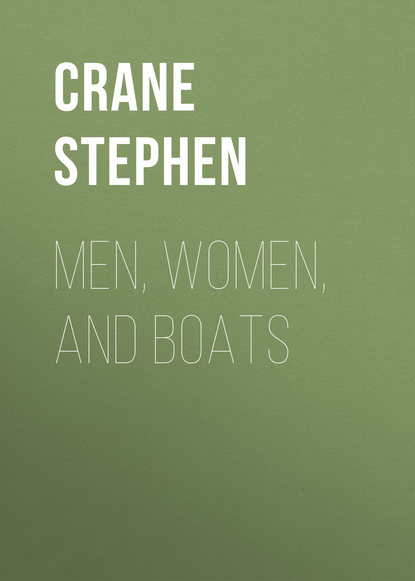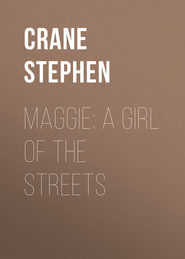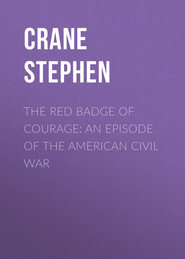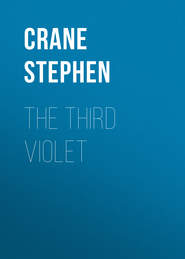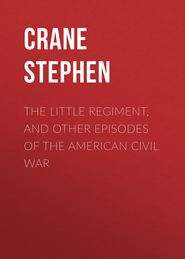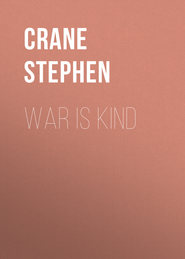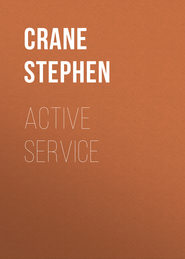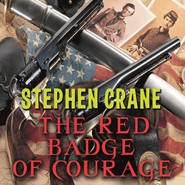По всем вопросам обращайтесь на: info@litportal.ru
(©) 2003-2025.
✖
Men, Women, and Boats
Автор
Год написания книги
2018
Настройки чтения
Размер шрифта
Высота строк
Поля
The lieutenant was frowning and serious at this task of division. His lips pursed as he drew with his sword various crevices in the heap until brown squares of coffee, astoundingly equal in size, appeared on the blanket. He was on the verge of a great triumph in mathematics, and the corporals were thronging forward, each to reap a little square, when suddenly the lieutenant cried out and looked quickly at a man near him as if he suspected it was a case of personal assault. The others cried out also when they saw blood upon the lieutenant's sleeve.
He had winced like a man stung, swayed dangerously, and then straightened. The sound of his hoarse breathing was plainly audible. He looked sadly, mystically, over the breastwork at the green face of a wood, where now were many little puffs of white smoke. During this moment the men about him gazed statue-like and silent, astonished and awed by this catastrophe which happened when catastrophes were not expected—when they had leisure to observe it.
As the lieutenant stared at the wood, they too swung their heads, so that for another instant all hands, still silent, contemplated the distant forest as if their minds were fixed upon the mystery of a bullet's journey.
The officer had, of course, been compelled to take his sword into his left hand. He did not hold it by the hilt. He gripped it at the middle of the blade, awkwardly. Turning his eyes from the hostile wood, he looked at the sword as he held it there, and seemed puzzled as to what to do with it, where to put it. In short, this weapon had of a sudden become a strange thing to him. He looked at it in a kind of stupefaction, as if he had been endowed with a trident, a sceptre, or a spade.
Finally he tried to sheath it. To sheath a sword held by the left hand, at the middle of the blade, in a scabbard hung at the left hip, is a feat worthy of a sawdust ring. This wounded officer engaged in a desperate struggle with the sword and the wobbling scabbard, and during the time of it he breathed like a wrestler.
But at this instant the men, the spectators, awoke from their stone-like poses and crowded forward sympathetically. The orderly-sergeant took the sword and tenderly placed it in the scabbard. At the time, he leaned nervously backward, and did not allow even his finger to brush the body of the lieutenant. A wound gives strange dignity to him who bears it. Well men shy from this new and terrible majesty. It is as if the wounded man's hand is upon the curtain which hangs before the revelations of all existence—the meaning of ants, potentates, wars, cities, sunshine, snow, a feather dropped from a bird's wing; and the power of it sheds radiance upon a bloody form, and makes the other men understand sometimes that they are little. His comrades look at him with large eyes thoughtfully. Moreover, they fear vaguely that the weight of a finger upon him might send him headlong, precipitate the tragedy, hurl him at once into the dim, grey unknown. And so the orderly-sergeant, while sheathing the sword, leaned nervously backward.
There were others who proffered assistance. One timidly presented his shoulder and asked the lieutenant if he cared to lean upon it, but the latter waved him away mournfully. He wore the look of one who knows he is the victim of a terrible disease and understands his helplessness. He again stared over the breastwork at the forest, and then turning went slowly rearward. He held his right wrist tenderly in his left hand as if the wounded arm was made of very brittle glass.
And the men in silence stared at the wood, then at the departing lieutenant—then at the wood, then at the lieutenant.
As the wounded officer passed from the line of battle, he was enabled to see many things which as a participant in the fight were unknown to him. He saw a general on a black horse gazing over the lines of blue infantry at the green woods which veiled his problems. An aide galloped furiously, dragged his horse suddenly to a halt, saluted, and presented a paper. It was, for a wonder, precisely like an historical painting.
To the rear of the general and his staff a group, composed of a bugler, two or three orderlies, and the bearer of the corps standard, all upon maniacal horses, were working like slaves to hold their ground, preserve, their respectful interval, while the shells boomed in the air about them, and caused their chargers to make furious quivering leaps.
A battery, a tumultuous and shining mass, was swirling toward the right. The wild thud of hoofs, the cries of the riders shouting blame and praise, menace and encouragement, and, last the roar of the wheels, the slant of the glistening guns, brought the lieutenant to an intent pause. The battery swept in curves that stirred the heart; it made halts as dramatic as the crash of a wave on the rocks, and when it fled onward, this aggregation of wheels, levers, motors, had a beautiful unity, as if it were a missile. The sound of it was a war-chorus that reached into the depths of man's emotion.
The lieutenant, still holding his arm as if it were of glass, stood watching this battery until all detail of it was lost, save the figures of the riders, which rose and fell and waved lashes over the black mass.
Later, he turned his eyes toward the battle where the shooting sometimes crackled like bush-fires, sometimes sputtered with exasperating irregularity, and sometimes reverberated like the thunder. He saw the smoke rolling upward and saw crowds of men who ran and cheered, or stood and blazed away at the inscrutable distance.
He came upon some stragglers, and they told him how to find the field hospital. They described its exact location. In fact, these men, no longer having part in the battle, knew more of it than others. They told the performance of every corps, every division, the opinion of every general. The lieutenant, carrying his wounded arm rearward, looked upon them with wonder.
At the roadside a brigade was making coffee and buzzing with talk like a girls' boarding-school. Several officers came out to him and inquired concerning things of which he knew nothing. One, seeing his arm, began to scold. "Why, man, that's no way to do. You want to fix that thing." He appropriated the lieutenant and the lieutenant's wound. He cut the sleeve and laid bare the arm, every nerve of which softly fluttered under his touch. He bound his handkerchief over the wound, scolding away in the meantime. His tone allowed one to think that he was in the habit of being wounded every day. The lieutenant hung his head, feeling, in this presence, that he did not know how to be correctly wounded.
The low white tents of the hospital were grouped around an old school-house. There was here a singular commotion. In the foreground two ambulances interlocked wheels in the deep mud. The drivers were tossing the blame of it back and forth, gesticulating and berating, while from the ambulances, both crammed with wounded, there came an occasional groan. An interminable crowd of bandaged men were coming and going. Great numbers sat under the trees nursing heads or arms or legs. There was a dispute of some kind raging on the steps of the school-house. Sitting with his back against a tree a man with a face as grey as a new army blanket was serenely smoking a corn-cob pipe. The lieutenant wished to rush forward and inform him that he was dying.
A busy surgeon was passing near the lieutenant. "Good-morning," he said, with a friendly smile. Then he caught sight of the lieutenant's arm and his face at once changed. "Well, let's have a look at it." He seemed possessed suddenly of a great contempt for the lieutenant. This wound evidently placed the latter on a very low social plane. The doctor cried out impatiently, "What mutton-head had tied it up that way anyhow?" The lieutenant answered, "Oh, a man."
When the wound was disclosed the doctor fingered it disdainfully. "Humph," he said. "You come along with me and I'll 'tend to you." His voice contained the same scorn as if he were saying, "You will have to go to jail."
The lieutenant had been very meek, but now his face flushed, and he looked into the doctor's eyes. "I guess I won't have it amputated," he said.
"Nonsense, man! Nonsense! Nonsense!" cried the doctor. "Come along, now. I won't amputate it. Come along. Don't be a baby."
"Let go of me," said the lieutenant, holding back wrathfully, his glance fixed upon the door of the old school-house, as sinister to him as the portals of death.
And this is the story of how the lieutenant lost his arm. When he reached home, his sisters, his mother, his wife sobbed for a long time at the sight of the flat sleeve. "Oh, well," he said, standing shamefaced amid these tears, "I don't suppose it matters so much as all that."
AN EXPERIMENT IN MISERY
It was late at night, and a fine rain was swirling softly down, causing the pavements to glisten with hue of steel and blue and yellow in the rays of the innumerable lights. A youth was trudging slowly, without enthusiasm, with his hands buried deep in his trousers' pockets, toward the downtown places where beds can be hired for coppers. He was clothed in an aged and tattered suit, and his derby was a marvel of dust-covered crown and torn rim. He was going forth to eat as the wanderer may eat, and sleep as the homeless sleep. By the time he had reached City Hall Park he was so completely plastered with yells of "bum" and "hobo," and with various unholy epithets that small boys had applied to him at intervals, that he was in a state of the most profound dejection. The sifting rain saturated the old velvet collar of his overcoat, and as the wet cloth pressed against his neck, he felt that there no longer could be pleasure in life. He looked about him searching for an outcast of highest degree that they too might share miseries, but the lights threw a quivering glare over rows and circles of deserted benches that glistened damply, showing patches of wet sod behind them. It seemed that their usual freights had fled on this night to better things. There were only squads of well-dressed Brooklyn people who swarmed towards the bridge.
The young man loitered about for a time and then went shuffling off down Park Row. In the sudden descent in style of the dress of the crowd he felt relief, and as if he were at last in his own country. He began to see tatters that matched his tatters. In Chatham Square there were aimless men strewn in front of saloons and lodging-houses, standing sadly, patiently, reminding one vaguely of the attitudes of chickens in a storm. He aligned himself with these men, and turned slowly to occupy himself with the flowing life of the great street.
Through the mists of the cold and storming night, the cable cars went in silent procession, great affairs shining with red and brass, moving with formidable power, calm and irresistible, dangerful and gloomy, breaking silence only by the loud fierce cry of the gong. Two rivers of people swarmed along the sidewalks, spattered with black mud, which made each shoe leave a scarlike impression. Overhead elevated trains with a shrill grinding of the wheels stopped at the station, which upon its leglike pillars seemed to resemble some monstrous kind of crab squatting over the street. The quick fat puffings of the engines could be heard. Down an alley there were somber curtains of purple and black, on which street lamps dully glittered like embroidered flowers.
A saloon stood with a voracious air on a corner. A sign leaning against the front of the door-post announced "Free hot soup to-night!" The swing doors, snapping to and fro like ravenous lips, made gratified smacks as the saloon gorged itself with plump men, eating with astounding and endless appetite, smiling in some indescribable manner as the men came from all directions like sacrifices to a heathenish superstition.
Caught by the delectable sign the young man allowed himself to be swallowed. A bartender placed a schooner of dark and portentous beer on the bar. Its monumental form upreared until the froth a-top was above the crown of the young man's brown derby.
"Soup over there, gents," said the bartender affably. A little yellow man in rags and the youth grasped their schooners and went with speed toward a lunch counter, where a man with oily but imposing whiskers ladled genially from a kettle until he had furnished his two mendicants with a soup that was steaming hot, and in which there were little floating suggestions of chicken. The young man, sipping his broth, felt the cordiality expressed by the warmth of the mixture, and he beamed at the man with oily but imposing whiskers, who was presiding like a priest behind an altar. "Have some more, gents?" he inquired of the two sorry figures before him. The little yellow man accepted with a swift gesture, but the youth shook his head and went out, following a man whose wondrous seediness promised that he would have a knowledge of cheap lodging-houses.
On the sidewalk he accosted the seedy man. "Say, do you know a cheap place to sleep?"
The other hesitated for a time, gazing sideways. Finally he nodded in the direction of the street, "I sleep up there," he said, "when I've got the price."
"How much?"
"Ten cents."
The young man shook his head dolefully. "That's too rich for me."
At that moment there approached the two a reeling man in strange garments. His head was a fuddle of bushy hair and whiskers, from which his eyes peered with a guilty slant. In a close scrutiny it was possible to distinguish the cruel lines of a mouth which looked as if its lips had just closed with satisfaction over some tender and piteous morsel. He appeared like an assassin steeped in crimes performed awkwardly.
But at this time his voice was tuned to the coaxing key of an affectionate puppy. He looked at the men with wheedling eyes, and began to sing a little melody for charity.
"Say, gents, can't yeh give a poor feller a couple of cents t' git a bed? I got five, and I gits anudder two I gits me a bed. Now, on th' square, gents, can't yeh jest gimme two cents t' git a bed? Now, yeh know how a respecter'ble gentlem'n feels when he's down on his luck, an' I—"
The seedy man, staring with imperturbable countenance at a train which clattered overhead, interrupted in an expressionless voice—"Ah, go t' h–!"
But the youth spoke to the prayerful assassin in tones of astonishment and inquiry. "Say, you must be crazy! Why don't yeh strike somebody that looks as if they had money?"
The assassin, tottering about on his uncertain legs, and at intervals brushing imaginary obstacles from before his nose, entered into a long explanation of the psychology of the situation. It was so profound that it was unintelligible.
When he had exhausted the subject, the young man said to him:
"Let's see th' five cents."
The assassin wore an expression of drunken woe at this sentence, filled with suspicion of him. With a deeply pained air he began to fumble in his clothing, his red hands trembling. Presently he announced in a voice of bitter grief, as if he had been betrayed—"There's on'y four."
"Four," said the young man thoughtfully. "Well, look here, I'm a stranger here, an' if ye'll steer me to your cheap joint I'll find the other three."
The assassin's countenance became instantly radiant with joy. His whiskers quivered with the wealth of his alleged emotions. He seized the young man's hand in a transport of delight and friendliness.
"B' Gawd," he cried, "if ye'll do that, b' Gawd, I'd say yeh was a damned good fellow, I would, an' I'd remember yeh all m' life, I would, b' Gawd, an' if I ever got a chance I'd return the compliment"—he spoke with drunken dignity—"b' Gawd, I'd treat yeh white, I would, an' I'd allus remember yeh."
The young man drew back, looking at the assassin coldly. "Oh, that's all right," he said. "You show me th' joint—that's all you've got t' do."
The assassin, gesticulating gratitude, led the young man along a dark street. Finally he stopped before a little dusty door. He raised his hand impressively. "Look-a-here," he said, and there was a thrill of deep and ancient wisdom upon his face, "I've brought yeh here, an' that's my part, ain't it? If th' place don't suit yeh, yeh needn't git mad at me, need yeh? There won't be no bad feelin', will there?"
"No," said the young man.
The assassin waved his arm tragically, and led the march up the steep stairway. On the way the young man furnished the assassin with three pennies. At the top a man with benevolent spectacles looked at them through a hole in a board. He collected their money, wrote some names on a register, and speedily was leading the two men along a gloom-shrouded corridor.
He had winced like a man stung, swayed dangerously, and then straightened. The sound of his hoarse breathing was plainly audible. He looked sadly, mystically, over the breastwork at the green face of a wood, where now were many little puffs of white smoke. During this moment the men about him gazed statue-like and silent, astonished and awed by this catastrophe which happened when catastrophes were not expected—when they had leisure to observe it.
As the lieutenant stared at the wood, they too swung their heads, so that for another instant all hands, still silent, contemplated the distant forest as if their minds were fixed upon the mystery of a bullet's journey.
The officer had, of course, been compelled to take his sword into his left hand. He did not hold it by the hilt. He gripped it at the middle of the blade, awkwardly. Turning his eyes from the hostile wood, he looked at the sword as he held it there, and seemed puzzled as to what to do with it, where to put it. In short, this weapon had of a sudden become a strange thing to him. He looked at it in a kind of stupefaction, as if he had been endowed with a trident, a sceptre, or a spade.
Finally he tried to sheath it. To sheath a sword held by the left hand, at the middle of the blade, in a scabbard hung at the left hip, is a feat worthy of a sawdust ring. This wounded officer engaged in a desperate struggle with the sword and the wobbling scabbard, and during the time of it he breathed like a wrestler.
But at this instant the men, the spectators, awoke from their stone-like poses and crowded forward sympathetically. The orderly-sergeant took the sword and tenderly placed it in the scabbard. At the time, he leaned nervously backward, and did not allow even his finger to brush the body of the lieutenant. A wound gives strange dignity to him who bears it. Well men shy from this new and terrible majesty. It is as if the wounded man's hand is upon the curtain which hangs before the revelations of all existence—the meaning of ants, potentates, wars, cities, sunshine, snow, a feather dropped from a bird's wing; and the power of it sheds radiance upon a bloody form, and makes the other men understand sometimes that they are little. His comrades look at him with large eyes thoughtfully. Moreover, they fear vaguely that the weight of a finger upon him might send him headlong, precipitate the tragedy, hurl him at once into the dim, grey unknown. And so the orderly-sergeant, while sheathing the sword, leaned nervously backward.
There were others who proffered assistance. One timidly presented his shoulder and asked the lieutenant if he cared to lean upon it, but the latter waved him away mournfully. He wore the look of one who knows he is the victim of a terrible disease and understands his helplessness. He again stared over the breastwork at the forest, and then turning went slowly rearward. He held his right wrist tenderly in his left hand as if the wounded arm was made of very brittle glass.
And the men in silence stared at the wood, then at the departing lieutenant—then at the wood, then at the lieutenant.
As the wounded officer passed from the line of battle, he was enabled to see many things which as a participant in the fight were unknown to him. He saw a general on a black horse gazing over the lines of blue infantry at the green woods which veiled his problems. An aide galloped furiously, dragged his horse suddenly to a halt, saluted, and presented a paper. It was, for a wonder, precisely like an historical painting.
To the rear of the general and his staff a group, composed of a bugler, two or three orderlies, and the bearer of the corps standard, all upon maniacal horses, were working like slaves to hold their ground, preserve, their respectful interval, while the shells boomed in the air about them, and caused their chargers to make furious quivering leaps.
A battery, a tumultuous and shining mass, was swirling toward the right. The wild thud of hoofs, the cries of the riders shouting blame and praise, menace and encouragement, and, last the roar of the wheels, the slant of the glistening guns, brought the lieutenant to an intent pause. The battery swept in curves that stirred the heart; it made halts as dramatic as the crash of a wave on the rocks, and when it fled onward, this aggregation of wheels, levers, motors, had a beautiful unity, as if it were a missile. The sound of it was a war-chorus that reached into the depths of man's emotion.
The lieutenant, still holding his arm as if it were of glass, stood watching this battery until all detail of it was lost, save the figures of the riders, which rose and fell and waved lashes over the black mass.
Later, he turned his eyes toward the battle where the shooting sometimes crackled like bush-fires, sometimes sputtered with exasperating irregularity, and sometimes reverberated like the thunder. He saw the smoke rolling upward and saw crowds of men who ran and cheered, or stood and blazed away at the inscrutable distance.
He came upon some stragglers, and they told him how to find the field hospital. They described its exact location. In fact, these men, no longer having part in the battle, knew more of it than others. They told the performance of every corps, every division, the opinion of every general. The lieutenant, carrying his wounded arm rearward, looked upon them with wonder.
At the roadside a brigade was making coffee and buzzing with talk like a girls' boarding-school. Several officers came out to him and inquired concerning things of which he knew nothing. One, seeing his arm, began to scold. "Why, man, that's no way to do. You want to fix that thing." He appropriated the lieutenant and the lieutenant's wound. He cut the sleeve and laid bare the arm, every nerve of which softly fluttered under his touch. He bound his handkerchief over the wound, scolding away in the meantime. His tone allowed one to think that he was in the habit of being wounded every day. The lieutenant hung his head, feeling, in this presence, that he did not know how to be correctly wounded.
The low white tents of the hospital were grouped around an old school-house. There was here a singular commotion. In the foreground two ambulances interlocked wheels in the deep mud. The drivers were tossing the blame of it back and forth, gesticulating and berating, while from the ambulances, both crammed with wounded, there came an occasional groan. An interminable crowd of bandaged men were coming and going. Great numbers sat under the trees nursing heads or arms or legs. There was a dispute of some kind raging on the steps of the school-house. Sitting with his back against a tree a man with a face as grey as a new army blanket was serenely smoking a corn-cob pipe. The lieutenant wished to rush forward and inform him that he was dying.
A busy surgeon was passing near the lieutenant. "Good-morning," he said, with a friendly smile. Then he caught sight of the lieutenant's arm and his face at once changed. "Well, let's have a look at it." He seemed possessed suddenly of a great contempt for the lieutenant. This wound evidently placed the latter on a very low social plane. The doctor cried out impatiently, "What mutton-head had tied it up that way anyhow?" The lieutenant answered, "Oh, a man."
When the wound was disclosed the doctor fingered it disdainfully. "Humph," he said. "You come along with me and I'll 'tend to you." His voice contained the same scorn as if he were saying, "You will have to go to jail."
The lieutenant had been very meek, but now his face flushed, and he looked into the doctor's eyes. "I guess I won't have it amputated," he said.
"Nonsense, man! Nonsense! Nonsense!" cried the doctor. "Come along, now. I won't amputate it. Come along. Don't be a baby."
"Let go of me," said the lieutenant, holding back wrathfully, his glance fixed upon the door of the old school-house, as sinister to him as the portals of death.
And this is the story of how the lieutenant lost his arm. When he reached home, his sisters, his mother, his wife sobbed for a long time at the sight of the flat sleeve. "Oh, well," he said, standing shamefaced amid these tears, "I don't suppose it matters so much as all that."
AN EXPERIMENT IN MISERY
It was late at night, and a fine rain was swirling softly down, causing the pavements to glisten with hue of steel and blue and yellow in the rays of the innumerable lights. A youth was trudging slowly, without enthusiasm, with his hands buried deep in his trousers' pockets, toward the downtown places where beds can be hired for coppers. He was clothed in an aged and tattered suit, and his derby was a marvel of dust-covered crown and torn rim. He was going forth to eat as the wanderer may eat, and sleep as the homeless sleep. By the time he had reached City Hall Park he was so completely plastered with yells of "bum" and "hobo," and with various unholy epithets that small boys had applied to him at intervals, that he was in a state of the most profound dejection. The sifting rain saturated the old velvet collar of his overcoat, and as the wet cloth pressed against his neck, he felt that there no longer could be pleasure in life. He looked about him searching for an outcast of highest degree that they too might share miseries, but the lights threw a quivering glare over rows and circles of deserted benches that glistened damply, showing patches of wet sod behind them. It seemed that their usual freights had fled on this night to better things. There were only squads of well-dressed Brooklyn people who swarmed towards the bridge.
The young man loitered about for a time and then went shuffling off down Park Row. In the sudden descent in style of the dress of the crowd he felt relief, and as if he were at last in his own country. He began to see tatters that matched his tatters. In Chatham Square there were aimless men strewn in front of saloons and lodging-houses, standing sadly, patiently, reminding one vaguely of the attitudes of chickens in a storm. He aligned himself with these men, and turned slowly to occupy himself with the flowing life of the great street.
Through the mists of the cold and storming night, the cable cars went in silent procession, great affairs shining with red and brass, moving with formidable power, calm and irresistible, dangerful and gloomy, breaking silence only by the loud fierce cry of the gong. Two rivers of people swarmed along the sidewalks, spattered with black mud, which made each shoe leave a scarlike impression. Overhead elevated trains with a shrill grinding of the wheels stopped at the station, which upon its leglike pillars seemed to resemble some monstrous kind of crab squatting over the street. The quick fat puffings of the engines could be heard. Down an alley there were somber curtains of purple and black, on which street lamps dully glittered like embroidered flowers.
A saloon stood with a voracious air on a corner. A sign leaning against the front of the door-post announced "Free hot soup to-night!" The swing doors, snapping to and fro like ravenous lips, made gratified smacks as the saloon gorged itself with plump men, eating with astounding and endless appetite, smiling in some indescribable manner as the men came from all directions like sacrifices to a heathenish superstition.
Caught by the delectable sign the young man allowed himself to be swallowed. A bartender placed a schooner of dark and portentous beer on the bar. Its monumental form upreared until the froth a-top was above the crown of the young man's brown derby.
"Soup over there, gents," said the bartender affably. A little yellow man in rags and the youth grasped their schooners and went with speed toward a lunch counter, where a man with oily but imposing whiskers ladled genially from a kettle until he had furnished his two mendicants with a soup that was steaming hot, and in which there were little floating suggestions of chicken. The young man, sipping his broth, felt the cordiality expressed by the warmth of the mixture, and he beamed at the man with oily but imposing whiskers, who was presiding like a priest behind an altar. "Have some more, gents?" he inquired of the two sorry figures before him. The little yellow man accepted with a swift gesture, but the youth shook his head and went out, following a man whose wondrous seediness promised that he would have a knowledge of cheap lodging-houses.
On the sidewalk he accosted the seedy man. "Say, do you know a cheap place to sleep?"
The other hesitated for a time, gazing sideways. Finally he nodded in the direction of the street, "I sleep up there," he said, "when I've got the price."
"How much?"
"Ten cents."
The young man shook his head dolefully. "That's too rich for me."
At that moment there approached the two a reeling man in strange garments. His head was a fuddle of bushy hair and whiskers, from which his eyes peered with a guilty slant. In a close scrutiny it was possible to distinguish the cruel lines of a mouth which looked as if its lips had just closed with satisfaction over some tender and piteous morsel. He appeared like an assassin steeped in crimes performed awkwardly.
But at this time his voice was tuned to the coaxing key of an affectionate puppy. He looked at the men with wheedling eyes, and began to sing a little melody for charity.
"Say, gents, can't yeh give a poor feller a couple of cents t' git a bed? I got five, and I gits anudder two I gits me a bed. Now, on th' square, gents, can't yeh jest gimme two cents t' git a bed? Now, yeh know how a respecter'ble gentlem'n feels when he's down on his luck, an' I—"
The seedy man, staring with imperturbable countenance at a train which clattered overhead, interrupted in an expressionless voice—"Ah, go t' h–!"
But the youth spoke to the prayerful assassin in tones of astonishment and inquiry. "Say, you must be crazy! Why don't yeh strike somebody that looks as if they had money?"
The assassin, tottering about on his uncertain legs, and at intervals brushing imaginary obstacles from before his nose, entered into a long explanation of the psychology of the situation. It was so profound that it was unintelligible.
When he had exhausted the subject, the young man said to him:
"Let's see th' five cents."
The assassin wore an expression of drunken woe at this sentence, filled with suspicion of him. With a deeply pained air he began to fumble in his clothing, his red hands trembling. Presently he announced in a voice of bitter grief, as if he had been betrayed—"There's on'y four."
"Four," said the young man thoughtfully. "Well, look here, I'm a stranger here, an' if ye'll steer me to your cheap joint I'll find the other three."
The assassin's countenance became instantly radiant with joy. His whiskers quivered with the wealth of his alleged emotions. He seized the young man's hand in a transport of delight and friendliness.
"B' Gawd," he cried, "if ye'll do that, b' Gawd, I'd say yeh was a damned good fellow, I would, an' I'd remember yeh all m' life, I would, b' Gawd, an' if I ever got a chance I'd return the compliment"—he spoke with drunken dignity—"b' Gawd, I'd treat yeh white, I would, an' I'd allus remember yeh."
The young man drew back, looking at the assassin coldly. "Oh, that's all right," he said. "You show me th' joint—that's all you've got t' do."
The assassin, gesticulating gratitude, led the young man along a dark street. Finally he stopped before a little dusty door. He raised his hand impressively. "Look-a-here," he said, and there was a thrill of deep and ancient wisdom upon his face, "I've brought yeh here, an' that's my part, ain't it? If th' place don't suit yeh, yeh needn't git mad at me, need yeh? There won't be no bad feelin', will there?"
"No," said the young man.
The assassin waved his arm tragically, and led the march up the steep stairway. On the way the young man furnished the assassin with three pennies. At the top a man with benevolent spectacles looked at them through a hole in a board. He collected their money, wrote some names on a register, and speedily was leading the two men along a gloom-shrouded corridor.





